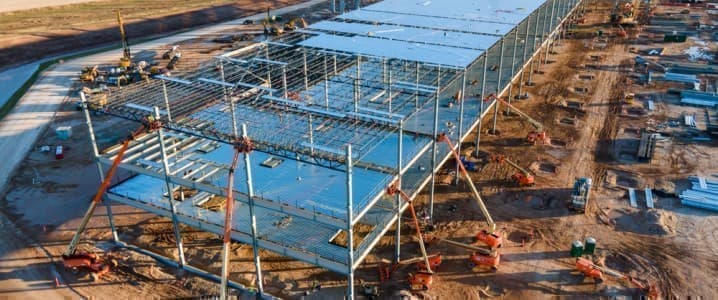Electric vehicle (EV) companies worldwide are constructing “gigafactories”, huge factories that produce very large numbers of batteries for electric vehicles. The construction of these types of factories is becoming more popular worldwide, as automakers look to manufacture batteries for their vehicles and ensure their supply chain is stable, particularly following the challenges of the Covid pandemic. Over the next decade, we can expect this model of battery production to become more commonplace, with lithium batteries being manufactured in several countries around the globe, supporting the rise of EV markets globally.
Tesla pioneered the concept of a gigafactory, aware that the company could drive costs down if it could mass produce lithium batteries for its EVs. But several automakers have since developed their own versions around the world. In Europe, the EV market is expanding rapidly, with sales revenue expected to reach $164 billion in 2023. This is projected to grow at a CAGR of 11.99 percent between 2023 and 2028, to reach $288 billion by 2028, equating to 4.83 million vehicles sold across the region.
As the EV market expands, automakers are looking to develop their own batteries in new gigafactories, both locally and in countries where manufacturing activities are cheaper. In 2022, it was projected that Europe’s EV gigafactory capacity pipeline would grow sixfold, to 789.2GWh by the end of the decade. The region is expected to become the fastest growing for lithium-ion battery capacity after China.
India’s Tata Group has big plans for the development of a $5.17 billion, 40GWh capacity electric battery plantin Somerset, in the U.K. under its new venture Agratas. This will be the largest factory of this type in Britain. It is expected to more than double the country’s EV battery pipeline capacity, producing around half of the EV batteries expected to be required by 2030, with production starting in 2026. The development is expected to create around 4,000 direct jobs and provide Jaguar Land Rover with EV batteries, according to the government. Tata may also supply batteries from the facility to other automakers in the U.K. and Europe.
The U.K. hopes the plant will also help generate thousands of indirect jobs in critical metals and minerals and battery materials. The government stated, “This investment will be crucial to boosting the UK’s battery manufacturing capacity needed to support the electric vehicle industry in the long term.” The state is expected to provide Tata with significant subsidies for the development, of almost $636 million. The secretary of state, Grant Shapps, said that the project was “certainly the biggest U.K. car investment for 40 years” and “a big vote of confidence in the British economy.” It will strongly support the U.K.’s aim to stop the sale of new diesel and gasoline cars and vans by 2030.
The move is expected to encourage other companies to invest in similar projects across the U.K. and Europe as the EV market in the region expands exponentially over the next decade. At present, there are 4 gigafactories in France, 9 in Germany, 34 in the U.S. and 283 in China. There is only 1 in the U.K. However, Ian Constance, the CEO of the Advanced Propulsion Centre, the body that runs the government’s automotive subsidies, stated “We have other gigafactory investments in the pipeline which we’re talking to,” and “This will only strengthen the case.”
While other automakers are gradually catching up, Tesla has long been at the forefront of EV battery production, investing $3.5 billion in its first gigafactory in Nevada in 2014. It aimed to build a facility capable of producing 35 GWh of battery cells annually, enough to manufacture around 500,000 vehicles a year. This represented a figure greater than the combined global battery manufacturing capacity at the time. Tesla has since developed a second gigafactory in Brandenburg, Germany, with plans to construct a third in Mexico.
Tesla’s Gigafactory Berlin-Brandenburg is its first location in Europe, demonstrating the company’s aim of expanding its market far beyond North America. And, in July, the company’s Mexico facility got the green light. The governor of the state of Nuevo Leon, Samuel Garcia, announced that the local authorities had completed the documentation required for Tesla to commence construction on its first gigafactory in the country, close to Monterrey. President Andrés Manuel López Obrador first announced the project in February. Batteries from the plant will likely be used in Tesla’s new, entry-level EV model, which is expected to cost around $25,000.
Automakers worldwide have followed Tesla’s model by developing gigafactories to produce their own lithium batteries to fit in their EVs. This is expected to support the expansion of EV markets worldwide, decrease the carbon emissions associated with transporting batteries over long distances, and strengthen supply chains. Tesla and several other automakers now have plans for multiple large-scale facilities in various countries around the globe, mainly centred around regions pegged for the biggest EV market growth over the coming decades.
By Felicity Bradstock for Oilprice.com
More Top Reads From Oilprice.com:
- What Does China's Stimulus Plan Mean For Rare Earths?
- Colombia’s Economic Woes Worsen As Cocaine Prices Plunge
- Energy Emergency Spurs Kyrgyzstan's Hydropower Collaboration With China

















